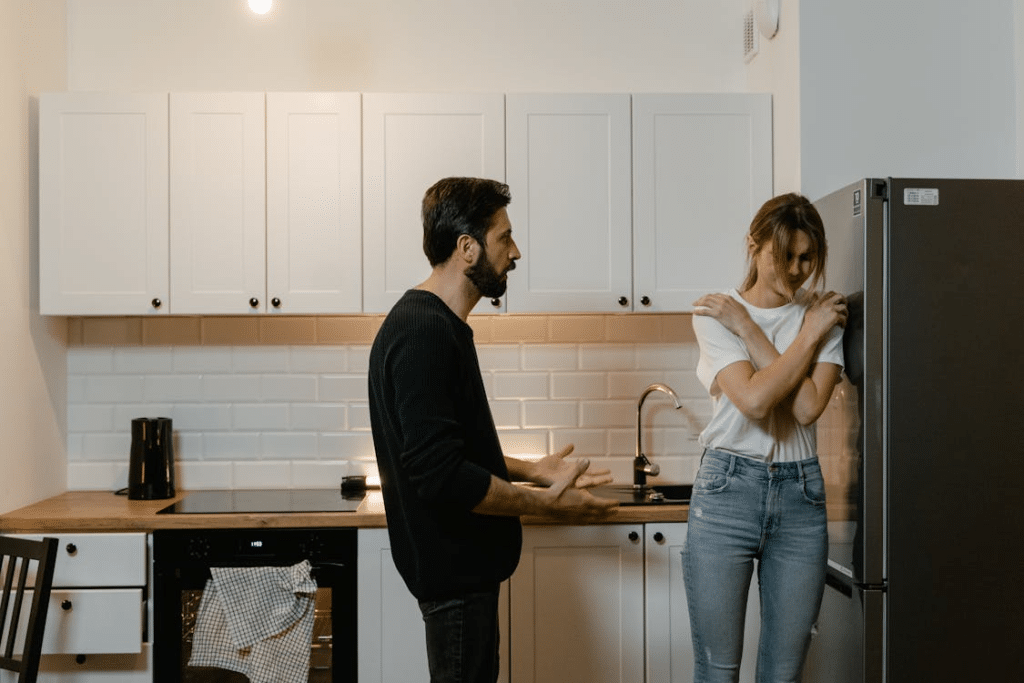
You’ve probably had that one relationship where you wanted her close until she got too close. Then suddenly, you pulled back. Or maybe you were the one constantly chasing, trying to “fix” things while she stayed distant and hard to read.
That exhausting push-and-pull is the avoidant–anxious cycle. It’s one of the biggest reasons couples keep breaking up, getting back together, and breaking up again.
You Crave Her, Then Feel Suffocated

You miss her when she’s gone, but when she starts showing affection, you suddenly feel cornered. You mistake her attention for pressure and her distance for peace. The cycle feels like relief and anxiety chasing each other in circles. Avoidant partners often confuse vulnerability with weakness. It makes them retreat the moment things get real.
You Keep Breaking Up But Never Moving On

The chemistry keeps you hooked, but nothing actually changes. That’s trauma bond. The anxious partner panics at disconnection, while the avoidant one feels smothered at reconnection. This dance releases stress hormones like cortisol and dopamine, which makes you addicted to emotional highs and lows.
You Mistake Distance for Strength

If you pride yourself on being “the calm one” or “less emotional,” that might be avoidance. You stay composed while she panics, convincing yourself that you’re the stable one. But emotional detachment is dressed as self-control. Avoidant men often believe that needing someone makes them weak. Pretending not to care only deepens her anxiety.
You’re Attracted to Unavailable Women

You tell yourself you want a “low-maintenance” partner, but somehow you always fall for women who can’t fully commit. They’re emotionally distant, still hung up on their ex, or “too busy for love.” This is your attachment pattern at work. People with avoidant tendencies subconsciously pick unavailable partners because it feels familiar and safe.
You Feel Guilty When She Gets Emotional

When she opens up, you freeze. You want to comfort her, but something inside you tenses. Maybe you change the topic, joke about it, or walk away. That’s a defense mechanism that avoidant men use to escape vulnerability. But emotions are signals to connect. Ignoring them only weakens trust.
You Chase When She Pulls Away

When she’s present, you feel restless, but when she distances herself, you panic. This inconsistency is insecurity. Attachment researchers say the chase gives your brain a dopamine rush, similar to gambling. You’re addicted to uncertainty. When love becomes a game of pursuit and retreat, nobody wins.
You Replay Every Argument in Your Head

After every fight, you overanalyze what she said, what you said, and what she meant. It’s like your mind can’t let go. That’s your anxious side talking, the part that fears rejection. Anxious partners often carry deep fears of abandonment rooted in childhood or past relationships. You can’t think your way out of insecurity. You have to face it.
You Feel Like You’re the Only One Trying

You put in effort, send texts first, plan dates, and try to “fix” the emotional gaps. But nothing feels enough. Meanwhile, she seems distant or distracted. This imbalance feeds resentment. You tell yourself she doesn’t care, but what’s really happening is attachment mismatch: one person craves closeness, the other fears it.
You Don’t Talk About Problems

Conflict makes you uncomfortable, so you wait it out, hoping it fades. But silence deepens it. You convince yourself you’re keeping the peace when you’re actually building emotional distance. Couples who avoid uncomfortable conversations end up losing intimacy entirely. Not through fighting, but through quiet disconnection.
You Confuse Her Anxiety for Neediness

When she texts often or worries you’re pulling away, you roll your eyes or shut down. But her behavior is fear. Anxious partners crave reassurance because they sense withdrawal. Your avoidance fuels her insecurity, which fuels your need for distance. It’s an emotional feedback loop that feels impossible to escape.
You Feel Relieved When She’s Busy

When she says she’s got plans or needs space, you feel oddly calm. That’s a red flag. You’re more comfortable with emotional distance than connection. Avoidant individuals often mistake independence for peace. But genuine peace comes from emotional security, not avoidance.
You Keep Relationships “Surface-Level”

You’re great at flirting, dating, and charming, but once things turn serious, you freeze. You start pulling away or picking fights to create space. Avoidant men often say they “just don’t feel it anymore,” when really, they’re terrified of intimacy. Keeping relationships shallow protects you, but it also guarantees loneliness.
You Romanticize the Past

When the relationship gets hard, you idealize your ex or fantasize about the “one that got away.” But nostalgia is a defense mechanism. It lets you escape the discomfort of the present.
Idealizing past love is a form of emotional avoidance. It keeps you detached from reality. Instead of fixing what’s wrong now, you chase a memory that no longer exists.
You Blame Her Emotional Reactions

You call her “too sensitive” or “dramatic,” thinking you’re just being logical. But that dismissiveness kills trust. When you invalidate someone’s emotions, you teach them that vulnerability is unsafe. Relationships because of emotional dismissal. The moment you stop listening, the connection dies.
You Call It Compatibility But It’s Just Familiar Pain

You say you “click” because she feels familiar, but what if that familiarity is just unresolved trauma? Sometimes what feels right is just what you’re used to. Breaking the avoidant–anxious loop means unlearning comfort in dysfunction.
Love shouldn’t make you anxious or numb. It should make you calm, curious, and safe. Not constantly guessing where you stand.






Ask Me Anything